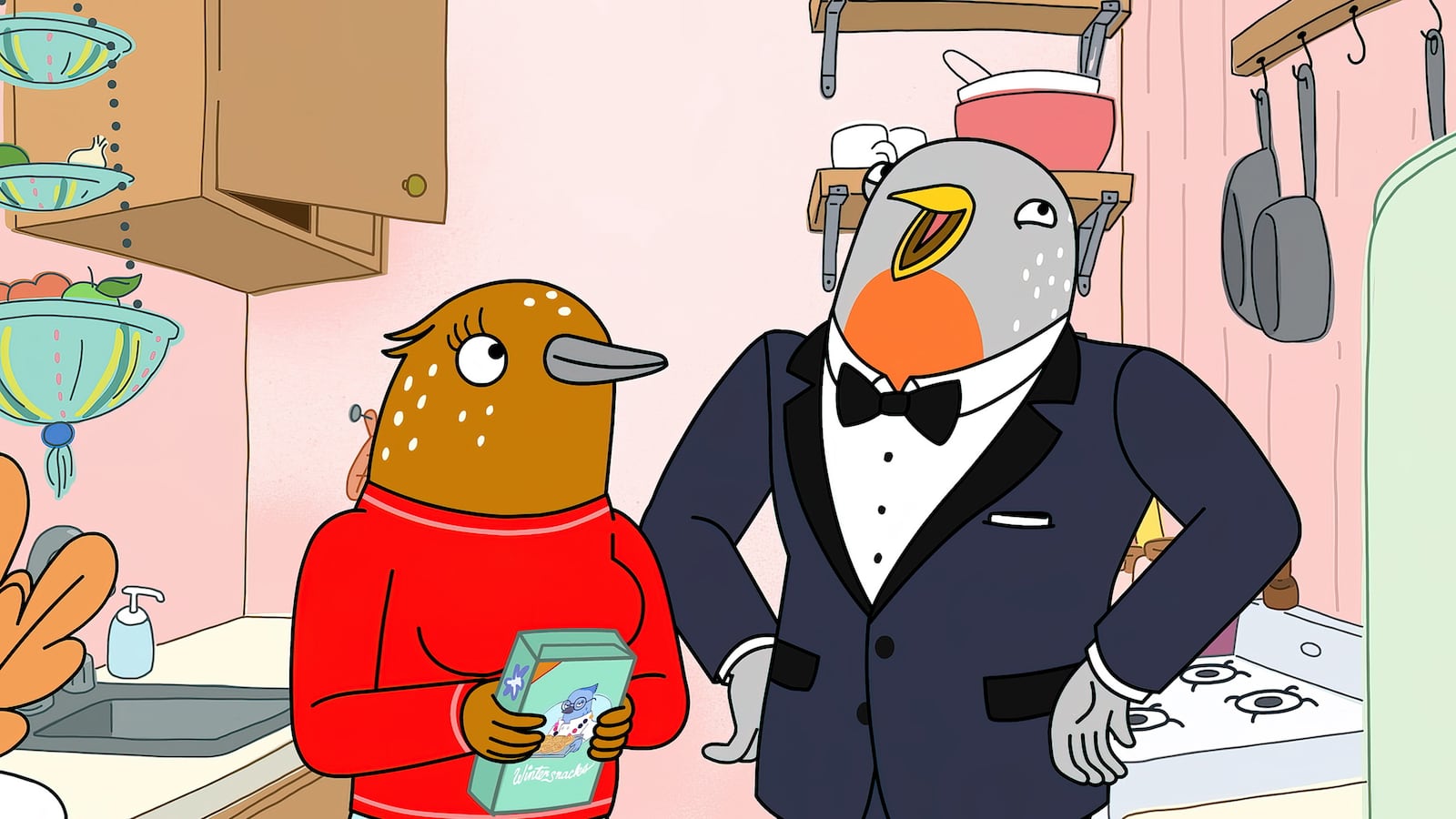Tuca & Bertie fans returning to Bird Town this summer might notice a few small changes. For one thing, we’ve done a bit of a time jump: While Bertie toils away at her home baking business, Tuca’s already recovered from a break-up with last season’s girlfriend, Kara, and is knee-deep in a new relationship—this time with a tree named Figgy.
Oh, and also, the express train (a giant snake with doors in its belly) is giving birth on the platform, its hatchlings eating everyone in town and then pooping them out. Could one liken this to the COVID-19 pandemic, which upended untold aspects of metropolitan life? You could call it that, but creator Lisa Hanawalt’s intentions are rarely that didactic.
Since its first season, Tuca & Bertie has charmed critics with its absurdist wit and frank exploration of difficult topics including sexual assault, PTSD, and addiction. And Season 3, which premiered Sunday on Adult Swim (and HBO Max), finds the animated series at its peak—or should we say beak? (Sorry.) This time around, our best bird friends, Tuca Toucan (Tiffany Haddish) and Bertie Songthrush (Ali Wong), are at transition points.
Among the biggest developments this season is Tuca’s relationship with Figgy, a warm-hearted tree voiced by Matthew Rhys. It seems like a dream at first, but the complication emerges quickly: He’s a heavy drinker, and while he’s happy to abstain from indulging in front of Tuca, he refuses to consider giving up the habit.
Speaking with The Daily Beast, Hanawalt said the idea for Tuca’s new relationship emerged during a conversation with Raphael Bob-Waksberg.
“He was thinking about alcoholism in a relationship, and how that would work,” Hanawalt said. “I knew I wanted [Tuca] to be in a new relationship with someone new, and it took me a long time to figure out, like, what is he?”
Would Tuca’s new love interest be an animal? A rabbit? Hanawalt wasn’t sure. “Then I was lying in bed one night and I suddenly just was like, ‘Oh, he’s a tree, and this is how his addiction shows itself.’”
When Figgy drinks, his leaves wither—a symptom he insists Tuca ignore. Figuring out this complicated relationship is just one of many challenges our favorite bodacious toucan will have to stare down this season. The most prominent among these draws inspiration from Hanawalt’s own life, a chronic medical issue she shares with a generous portion of the population.
Ever since Tuca’s menstrual cycle began, she’s suffered debilitating pain during her period—an affliction doctor after doctor has written off. A parade of specialists all compete to seem like the smartest person in the room—actually, in this case all the doctors are bees, who work for Hive Medical—but none of them can address their patient holistically. To top it all off, their bedside manner sucks.
Hanawalt said the story line was based, in part, on an experience of her own. “I was in a lot of pain and didn’t know why,” she said. “Tiffany [had also] had a similar experience in her life—just trying to find an answer and talking to so many other people who have had a similar medical issue and haven’t been able to find a solution.”
Even after an exploratory surgery in which doctors removed a fibroid, Hanawalt said, her medical concerns remained unresolved. When it came to Tuca’s medical issues, she said, “I didn’t wanna make it super specific. Some people will watch it and say, oh, this is clearly about endometriosis. I think that’s a really strong analogy, but we never fully like identify it as any particular.”
Storylines like these remain uncommon on television; as Turning Red taught us, right-wing reactionaries would call even the mere mention of a period unfathomable. But Tuca’s medical struggles and the self-alienation and depression that come with them are all too common. “When a chronic illness attacks your own sense of yourself and who you are,” Hanawalt said, “I think that’s really upsetting.”
Throughout its run, Tuca & Bertie has used surreal humor and fantastical illustrations to bring its characters’ internal struggles to life. Last season, Bertie described her mind as a haunted house to her therapist—a notion that came complete with an illustration in which her head became a creepy turret.
This season, Tuca’s emotional turmoil takes shape as a blanket of soil that her caretakers water when she’s stuck in bed recovering from the illness seemingly no doctor can diagnose. As the flowers bloom, we see her physical health is improving. As Tuca lies in that grave-like bed, however, the usually vibrant toucan looks as bereft as her FOMO makes her feel.
Meanwhile Bertie, whose trauma recovery has served as something of a backbone to the series, kicks off the season with a new opportunity. Chef Winter Garcia (Justina Machado) offers to mentor Bertie if she’s willing to give up her business to come work at the star chef’s bakery. But Bertie’s not sure if she’s ready to give up her business just as she’s begun to live the dream of her twenties, especially given the traumatic experience she’s still processing from her last mentorship.
That tension is what Hanawalt finds most interesting about Bertie and Chef Winter Garcia’s relationship. “Is this gonna feed her? Is this gonna be a good path for Bertie, or is this gonna be another kind of dead end? Winter’s interesting because I relate to both her and Bertie in this relationship.”
“As a woman who’s getting a little older and now I have women in the workplace who look up to me and I’m like, ‘Oh, you look up to me? Yikes.’ Part of me is like, ‘Why would you? I’m just an idiot.’ And then part of me has to reckon with whatever power or influence I do have... I just think both sides of that are interesting.”
Both Bertie and her long-term boyfriend, Speckle—voiced by the upsettingly charming Steven Yeun—are focusing on their careers this season. While Bertie decides what kind of baker she would like to become, Speckle’s hard at work on an affordable housing project on the same lot where the house he’d renovated for himself and Bertie once stood. (It got wiped away by a flood last season, because much like in real life, nothing in Bird Town is ever a sure thing.)

Speckle has emerged as something of an everyman hero among some Tuca & Bertie fans. (Has this writer described this animated bird to her therapist as the Platonic ideal for a life partner? Who knows—that’s confidential!) But every season, the prospect of a potential break-up looms large. This season is no different; as Bertie and Speckle hone in on their professional dreams, they seem to be losing sight of one another.
Hanawalt described Speckle as something of a love letter to her real-life romantic partner, Adam Conover. So she can certainly understand why some fans are so keen on Speckle. Still, she points out, he might be benefiting from something of a double standard.
“I think people do tend to do that with male characters, and they get more upset when female characters are flawed than they do with male characters,” she said. “I think that he gets more of a pass sometimes, where people are very, very tough on Bertie.”
Hanawalt wouldn’t say where, exactly, Speckle and Bertie are headed, but it seems safe to assume their relationship won’t be getting simpler any time soon. “How do you deal with a long-term partner when they go through something difficult, or they change, or they go through a big life shift?” Hanawalt said. “All of that, I’m interested in.”







